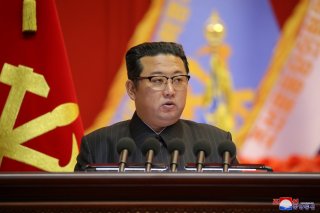North Korea Still Won't Sign the Korean War Peace Declaration
Seoul has reached an agreement with the United States on a draft declaration that, if put into effect, would officially end the Korean War. The only problem? Pyongyang.
South Korean foreign minister Chung Eui-yong announced on Wednesday that Seoul had reached an agreement with the United States on a draft declaration that, if put into effect, would officially end the Korean War.
Chung informed reporters on Wednesday that South Korea and the United States had “already shared the understanding” with each other, according to reporting by the South Korean Yonhap News Agency.
However, the foreign minister underlined that the ultimate decision to formally end the war would rest with North Korea, which has largely remained unresponsive to peace overtures from Washington and Seoul in recent years. Kim Yo-jong, the sister of North Korean Supreme Leader Kim Jong-un, described an end to the war as an “admirable” goal in September but criticized South Korean leaders for “hostile” policymaking. Vice Foreign Minister Ri Thae Song said the same month that the north would not agree to an official peace declaration until U.S. policies toward Pyongyang were improved.
Chung was optimistic in his remarks, claiming that “North Korea showed a set of prompt, positive responses to the end-of-war declaration.”
“We hope [it] will show a more concrete reaction,” he added, noting that many South Korean observers would be watching the ongoing party conference in Pyongyang for signs of Kim’s attitude toward reconciliation with the south in 2022.
The Korean War, fought from 1950 to 1953, resulted in a military stalemate near the 38th parallel. The front line of the war is now the “Demilitarized Zone,” a heavily armed border area dividing the two Koreas.
The agreement reached between U.S., North Korean, and Chinese diplomats in 1953 was an armistice rather than a peace treaty. It was intended to “ensure a complete cessation of hostilities and of all acts of armed force in Korea until a final peaceful settlement is achieved”—leaving unresolved the question of what the final settlement would look like. Consequently, North and South Korea have technically remained at war for more than seventy years.
When asked about Chung’s remarks, a State Department spokesman emphasized the role of ongoing diplomacy in reaching a peace agreement in Korea.
“The United States remains committed to achieving lasting peace on the Korean Peninsula through dialogue and diplomacy with the DPRK,” the spokesman said, using the acronym of North Korea’s official name.
Trevor Filseth is a current and foreign affairs writer for the National Interest.
Image: Reuters

